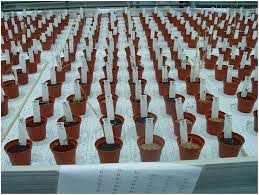The dream of establishing sustainable habitats on the moon or Mars requires innovative solutions for food production. Researchers at Wageningen University & Research and the B.A.S.E. project are exploring the feasibility of growing crops in a circular and sustainable manner, utilizing local resources. Their latest study, published in Open Agriculture, unveils a groundbreaking method: applying human urine in the form of struvite as fertilizer significantly boosts green bean growth on Mars and moon regolith simulants.
Unlike conventional fertilizers, which may contain contaminants, human urine-derived struvite offers a pure and sustainable alternative. Principal investigator Wieger Wamelink explains, “Struvite is a mineral extracted from human urine, consisting of magnesium ammonium and phosphate. It is almost 100% pure, devoid of any contaminations like medicine residues or drugs.” This slow-release fertilizer provides essential nutrients for plant growth without introducing harmful substances.
The study conducted by the research team utilized regolith simulants, as genuine Mars and moon regoliths are unavailable on Earth in sufficient quantities. These simulants lack essential nutrients such as ammonium, nitrate, and phosphate necessary for plant growth. By introducing struvite as fertilizer, the researchers observed a significant increase in green bean harvest, demonstrating its effectiveness in enhancing crop yield.
While the study yielded promising results, the researchers refrained from consuming the green beans due to regulatory restrictions and concerns about potential contamination from poisonous metals present in the regolith. Further research is warranted to assess the risk of heavy metal contamination in crops grown in regolith-based environments.
The application of struvite as fertilizer represents a crucial step towards establishing a closed and sustainable agricultural ecosystem on Mars and the moon. Wamelink envisions a “golden circle” of crop growth, where human waste, in the form of urine, is recycled and utilized as fertilizer. This approach not only holds promise for extraterrestrial colonization but also offers sustainable solutions for terrestrial agriculture.
The B.A.S.E. project aims to establish a self-sustaining crop production system within a moon/Mars dome, integrating various elements such as pollinators, bacteria, fungi, and earthworms. This research facility serves as a blueprint for sustainable food production in extreme environments, with potential applications in deserts or polar regions on Earth.
The Food For Mars and Moon project continues to push the boundaries of agricultural innovation, paving the way for sustainable habitation beyond Earth’s confines. With each breakthrough, humanity moves closer to realizing the dream of establishing self-sustaining colonies on distant celestial bodies.
